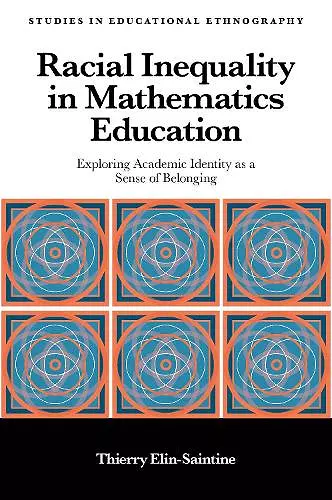Racial Inequality in Mathematics Education
Exploring Academic Identity as a Sense of Belonging
Format:Hardback
Publisher:Emerald Publishing Limited
Published:26th Aug '21
Should be back in stock very soon

Reform initiatives in mathematics education have been reluctant to embrace racial equity as a core or guiding principle. The field is replete with studies on Black students' poor performance in mathematics education and of its persistence. Conversely, success in mathematics is rarely associated with groups of African or African American descent.
The abundance of data on the failure of Black students in mathematics has contributed to mainstream beliefs of a racial hierarchy of mathematics ability in America. This perception has not only shaped attitudes and behaviors of educational practitioners, but it has contributed to the alienation of many students from the community of 'doers of mathematics.' This study examines the mathematics identity of a group of seniors enrolled in honor's pre-calculus at a comprehensive high school. Data collected and analyzed for this book shows that participants, in spite of a history of success in mathematics and despite viewing the classroom as opportunity to challenge disparaging views of Black Americans, refused to seek membership in the math community.
Saintine focuses on the mathematic identity construction of 11 Black students and their own perception of mathematics education. This work offers new insights into the racial opportunity-gap in mathematics and challenges longstanding assumptions about 'what' or 'who' is a math person.
This book skillfully unpacks the complexities of race, academic identity, and learning in a Philadelphia high school classroom. Saintine asks: what does it mean to be a 'math person' and why is this problematic myth so durable? As a mathematics professor with an impressive background in performing arts, creative writing, and urban education, Saintine rejects the dualistic and overly simplistic idea that world can be parsed into math persons and non-math people. This is a wonderful ethnography that elevates black and Latinx students' voices and reflections on themselves and their school. The book calls for a new social imaginary that begins with a reconceptualization of math education in urban schools. -- Will J. Jordan, Temple University, USA
This text is a must-read for pre-service and in-service teachers of mathematics to examine the ways in which mathematics education continues to limit opportunities for Black students. Myths about who is and who is not a math person are pervasive and continue to dissuade historically-excluded students from persisting in mathematics as a discipline. Elin-Saintine presents the results of an ethnographic study that examines academic identity and sense of belong among a group of Black high schools students in a honor's pre-calculus class. The counterstories that emerge from this study challenge age-old assumptions and help teachers to understand the complex nature of mathematics learning in a race-based society. Most importantly, the text offers teaching strategies to foster the development of academic identity in Black students who, as a racial/ethnic group, have the brilliance to succeed in advanced mathematics courses.
-- Jacqueline Leonard, PhD, University of Wyoming, USAThis book is a very welcome addition to recent scholarship on race, identity, and mathematics education. Pushing back on stereotypes and common-sense ideas about who can do mathematics, this book makes explicit how concepts like ability and competence are not innate traits of a selected few but are contested and negotiated opportunities that are readily made available to some students and denied to others. This book-through the voices and experiences of young people-ask readers to think about who gets to be considered a legitimate doer of mathematics, under what circumstances, and with what material consequences. This intellectually honest case study will challenge teachers to rethink their roles in these negotiations. More broadly, this book will appeal to mathematics education researchers, graduate students, in-service and pre-service teachers, school administrators, policy makers, and others who are interested in the realities of race in schools but who are also willing to engage in anti-racist practice. For all who pick up this book, I urge three things: listen, hear, and act.
-- Danny Bernard Martin, University of Illinois at ChicagoProfessor Elin-Saintine's work demonstrates clearly how identity is central to the learning process. Further, he shows that ideas about race are not just attitudes that individuals have about other individuals, but that racism is built into the structure of our educational institutions and the culture of math education. And those attitudes flourish because they are disguised behind ideas of what it means to be good at math. As such this work stands to advance our understanding of how to support students of mathematics from diverse backgrounds. Further, it will be a support for practitioners in the field seeking to better understand how to mentor their students.
-- Wesley Shumar, Professor, Department of Communication, Affiliated Faculty, School of Education, Drexel UniversityISBN: 9781787698864
Dimensions: 229mm x 152mm x 13mm
Weight: 340g
152 pages